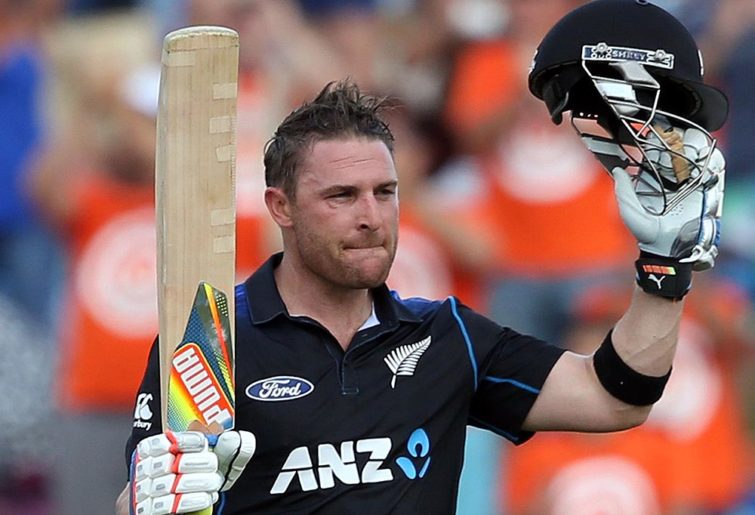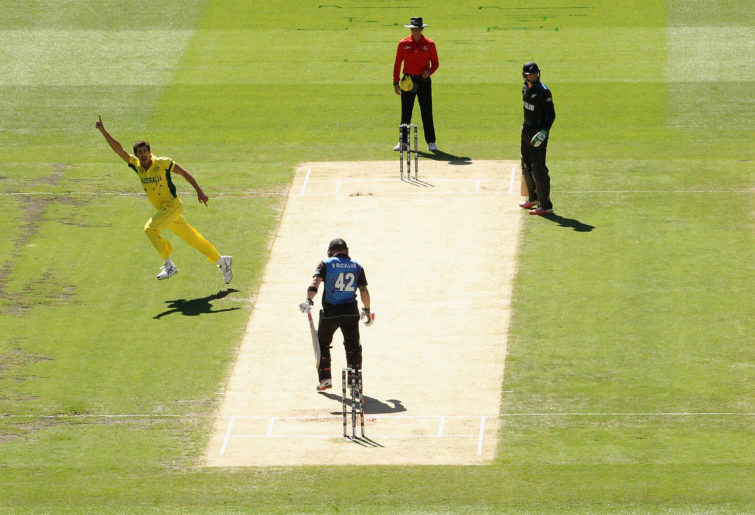WATCH: Cam Green soars with 'Go go Gadget' arms to take an IPL stunner
The Aussie needed every centimetre of his height and reach to reel that one in!
It’s taken four years, and I’m still on the fence about Brendon McCullum’s third ball duck in the 2015 World Cup final.
Was it a reckless brain explosion at the most critical moment in his nation’s cricketing history? That’s what I thought on the day. Or was it the dice that had to be rolled, and like any gamble, you accept the good with the bad? That’s what I thought in the aftermath.
But I’ve flicked back and forth since then. Splinters are still firmly in the backside.
To give context to that first over, McCullum had been the player of the World Cup. Forget Mitchell Starc’s man of the tournament heroics with the ball, or Martin Guptill’s imperious run-making throughout the six weeks. McCullum was the guy everyone was transfixed on, for a host of reasons.
Under his leadership, he shed New Zealand’s underdog tag and positioned them firmly as the aggressor; the team to be chased.
To illustrate their attack-at-all-costs mentality, we can look back at the Black Caps’ third group game of the World Cup, where they rolled England for 123, then chased down the total in a breathtaking 12.2 overs.
The Cricinfo results page almost comically reminds us they did it with ‘226 balls remaining’. McCullum would finish with 77 off 25, and Steven Finn the rather unfortunate figures of 2-0-49-0.

(AFP PHOTO / Michael Bradley)
The Black Caps would attack at all costs but, at distinct odds with the Australian team’s modus operandi, would strictly limit their aggression to the bat vs ball contest. In the view of McCullum and coach Mike Hesson, aggressive stroke play, bowling and field settings didn’t have to be paired with bravado. Send-offs were unnecessary, and sledging was wasted energy.
So McCullum and his team continued swinging freely after topping Group A with six wins from six. It was a formula that worked to devastating effect.
In the quarter-final against the Windies, Guptill’s incredible 237 led them to 6/393, the sixth-highest ever World Cup total. In the semi-final, Grant Elliott’s heroics helped them chase down South Africa’s DLS-modified score with just one ball remaining.
McCullum would plunder 59 off 26 in that innings, including 25 off one Dale Steyn over. There were tears of joy afterwards in the stands – a rugby-like atmosphere in Auckland that AB de Villiers said was “probably the most electric crowd I’ve ever heard in my life”.
McCullum said he hoped everyone would remember that night forever, because he and his players certainly would. Having never qualified for a World Cup final, it was undoubtedly New Zealand’s greatest hour.
Cricket purists across the ditch had always dreamed of this moment, but never truly thought their sport could captivate the nation like rugby. Everyone had jumped aboard for the ride, and leading from the front was McCullum.
Before the final, pre-game narrative honed in on the fairytale Black Caps story, and whether they would continue their ultra-positive style at the crease. Was there such thing as too much aggression?
“I don’t think so,” McCullum said.
“For us, we need to play like that, that’s how we’re going to beat teams on regular occasions. We’re not afraid of losing. It gives us our greatest chance of success against big opposition teams on a regular basis.”
He added: “Whoever grabs the key moments will determine the outcome of this game.”
So, after strolling to the middle for the toss on that sunny autumn day, McCullum called correctly and opted to bat first in front of 93,000 at the MCG. Starc, Australia’s shining light in the tournament (22 wickets at 10.2, economy 3.5), had the new ball, looking to generate the deadly in-swing that had yielded so much success throughout the previous six weeks.
Guptill faced up first, and got off strike with a single off the second delivery of the day. And that’s when it all started.
Starc’s first ball to McCullum was a beauty, cutting him in half and only just missing off stump in the process. True to his word, the skipper hadn’t held back, and swung as hard as he could. Not even one sighter, Brendon? Apparently not.
The next ball was even worse for McCullum. He gave himself room and came down the track, looking to go even harder at Starc, only to be beaten once again – this time down leg side. “It’s a nervous start” Mark Taylor remarked on commentary. Ok, Brendon, let’s just see out this first over, yeah?
But soon it was all over. After missing off stump, then missing leg, Starc’s third ball to McCullum was bang on the money, crashing into the off peg, cuing wild celebrations from the Aussies. They knew they had the danger man.

(Photo by Quinn Rooney/Getty Images)
Did McCullum need to go so hard? Could he not have absorbed the pressure momentarily, rather than fighting fire with fire?
Sure, conventional wisdom said he should have. But he – and his whole side – may not have even been contesting the final if that approach was in his makeup.
In the semi-final, McCullum had gone after Steyn and Philander from the get-go, and his whirlwind innings had played a role in seeing them home with just a ball to spare. So if it worked then, and if it had worked for numerous matches previous, why change things now?
Still, I can see both arguments. I’m still not sure where I stand. What I do know, is that McCullum was inflexible in his philosophy, but not stubborn. He was steadfast in the belief that the best chance for his side to win was for him to attack from the outset. It was always, always, team first.
Whatever the case, McCullum was magnanimous and gracious as ever post-game. The cricket world would have forgiven a whinge about a fairly classless Australian side during that final. Heck, they would have welcomed it. But he wasn’t drawn into that.
“Good luck to them,” he said of his opponent.
A symbol of sportsmanship and playing in the right spirit, perhaps this was Brendon McCullum’s greatest mark on the 2015 World Cup. He certainly won a world of admirers in the aftermath, irrespective of whether he could have allowed himself a couple of sighters.